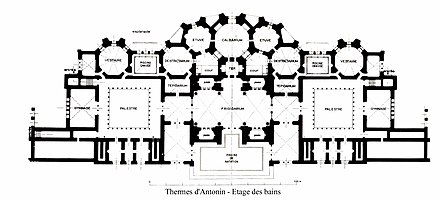 Ruins of the Baths of Antoninus | |
| Location | Carthage, Tunisia |
|---|---|
| Region | North Africa |
| Coordinates | 36°51′16″N 10°20′06″E / 36.854321°N 10.335104°E |
| Type |
Thermae Dimensions : Over 200 m on 100 m |
| History | |
| Builder | Antoninus Pius |
| Founded | 145-162 |
| Official name | Archaeological Site of Carthage |
| Type | Cultural |
| Criteria | ii, iii, vi |
| Designated | 1979 (3rd session), together with Carthage [1] |
| Reference no. | 37 |
| Region | Arab States |
The Baths of Antoninus or Baths of Carthage, located in Carthage, Tunisia, are the largest set of Roman thermae built on the African continent and one of three largest built in the Roman Empire. They are the largest outside mainland Italy. [2] The baths are also the only remaining Thermae of Carthage that dates back to the Roman Empire's era. The baths were built during the reign of Roman Emperor Antoninus Pius. [3]
The baths are at the South-East of the archaeological site, near the presidential Carthage Palace. The archaeological excavations started during the Second World War and concluded by the creation of an archaeological park for the monument. It is also one of the most important landmarks of Tunisia.
The baths are today part of the Archaeological site of Carthage on the list of World Heritage sites of UNESCO. On 17 February 2012, the Tunisian government proposed the Roman hydraulic complex Zaghouan- Carthage, that the baths are part of, as a future World Heritage site. [4]


- ^ (in French) Site archéologique de Carthage (Patrimoine mondial de l’Unesco)
- ^ "Where climate change threatens ancient sites and modern livelihoods". Christian Science Monitor. 10 February 2020.
- ^ "How many ancient cities do you know? Quiz answers". TheGuardian.com. 15 November 2013.
- ^ (in French) Dossier du complexe hydraulique romain de Zaghouan-Carthage (Unesco)
 Ruins of the Baths of Antoninus | |
| Location | Carthage, Tunisia |
|---|---|
| Region | North Africa |
| Coordinates | 36°51′16″N 10°20′06″E / 36.854321°N 10.335104°E |
| Type |
Thermae Dimensions : Over 200 m on 100 m |
| History | |
| Builder | Antoninus Pius |
| Founded | 145-162 |
| Official name | Archaeological Site of Carthage |
| Type | Cultural |
| Criteria | ii, iii, vi |
| Designated | 1979 (3rd session), together with Carthage [1] |
| Reference no. | 37 |
| Region | Arab States |
The Baths of Antoninus or Baths of Carthage, located in Carthage, Tunisia, are the largest set of Roman thermae built on the African continent and one of three largest built in the Roman Empire. They are the largest outside mainland Italy. [2] The baths are also the only remaining Thermae of Carthage that dates back to the Roman Empire's era. The baths were built during the reign of Roman Emperor Antoninus Pius. [3]
The baths are at the South-East of the archaeological site, near the presidential Carthage Palace. The archaeological excavations started during the Second World War and concluded by the creation of an archaeological park for the monument. It is also one of the most important landmarks of Tunisia.
The baths are today part of the Archaeological site of Carthage on the list of World Heritage sites of UNESCO. On 17 February 2012, the Tunisian government proposed the Roman hydraulic complex Zaghouan- Carthage, that the baths are part of, as a future World Heritage site. [4]


- ^ (in French) Site archéologique de Carthage (Patrimoine mondial de l’Unesco)
- ^ "Where climate change threatens ancient sites and modern livelihoods". Christian Science Monitor. 10 February 2020.
- ^ "How many ancient cities do you know? Quiz answers". TheGuardian.com. 15 November 2013.
- ^ (in French) Dossier du complexe hydraulique romain de Zaghouan-Carthage (Unesco)